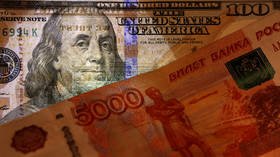Iran and Venezuela strike oil swap deal in the face of US sanctions

Iran and Venezuela have struck a deal to swap heavy Venezuelan crude for Iranian condensate, Reuters has reported, citing unnamed sources familiar with the deal.
According to these sources, the swaps are set to begin this week and last for six months, although they could be extended. The imports of Iranian superlight crude will help Venezuela revive its falling oil exports amid US sanctions that, among other problems, have cut off the country's access to the light oil that is used to blend with its superheavy to make it exportable.
For Iran, the deal will bring in heavy crude it could sell in Asia, the Reuters sources also said. The diluted Venezuela crude will also likely go to Asian buyers.
Also on rt.com US sanctions become blessing in disguise for Iran’s energy sectorReuters also reported that, according to the US Treasury Department, the deal could constitute a breach of sanctions, to which both Venezuela and Iran are subjects.
"Transactions with NIOC by non-US persons are generally subject to secondary sanctions," the Treasury Department said in response to a Reuters request for comments on the deal. It added that it "retains authority to impose sanctions on any person that is determined to operate in the oil sector of the Venezuelan economy."
Despite the sanction noose, Venezuela has been ramping up its oil exports, generating vital revenue. According to a recent Reuters report, the country, which is home to the world's largest oil reserves, exported more than 700,000 bpd of crude in July—the highest daily export rate since February.
Most of the oil went to China and Malaysia, although the latter is usually only a stop along Venezuelan oil's trip to China. The same report noted that three of the five crude oil blending facilities in the Orinoco Belt were operational, and another crude upgrader was preparing to restart operations after a year's pause.
Also on rt.com India hopes to import more Iranian, Venezuelan crude under BidenIran, meanwhile, recently revealed plans to attract some $145 billion in oil and gas investments from both local and foreign sources.
"We plan to invest $145 billion in the development of the upstream and downstream oil industry over the next four to eight years, hence I welcome the presence of domestic and foreign investors in the industry," Javad Owji, Iran's new oil minister, said during a meeting with executives from China's oil giant Sinopec.
This article was originally published on Oilprice.com













